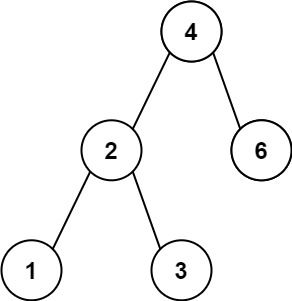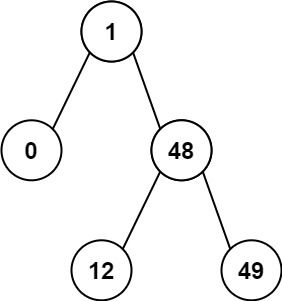Welcome to Subscribe On Youtube
530. Minimum Absolute Difference in BST
Description
Given the root of a Binary Search Tree (BST), return the minimum absolute difference between the values of any two different nodes in the tree.
Example 1:

Input: root = [4,2,6,1,3] Output: 1
Example 2:

Input: root = [1,0,48,null,null,12,49] Output: 1
Constraints:
- The number of nodes in the tree is in the range
[2, 104]. 0 <= Node.val <= 105
Note: This question is the same as 783: https://leetcode.com/problems/minimum-distance-between-bst-nodes/
Solutions
-
/** * Definition for a binary tree node. * public class TreeNode { * int val; * TreeNode left; * TreeNode right; * TreeNode() {} * TreeNode(int val) { this.val = val; } * TreeNode(int val, TreeNode left, TreeNode right) { * this.val = val; * this.left = left; * this.right = right; * } * } */ class Solution { private int ans; private int prev; private int inf = Integer.MAX_VALUE; public int getMinimumDifference(TreeNode root) { ans = inf; prev = inf; dfs(root); return ans; } private void dfs(TreeNode root) { if (root == null) { return; } dfs(root.left); ans = Math.min(ans, Math.abs(root.val - prev)); prev = root.val; dfs(root.right); } } -
/** * Definition for a binary tree node. * struct TreeNode { * int val; * TreeNode *left; * TreeNode *right; * TreeNode() : val(0), left(nullptr), right(nullptr) {} * TreeNode(int x) : val(x), left(nullptr), right(nullptr) {} * TreeNode(int x, TreeNode *left, TreeNode *right) : val(x), left(left), right(right) {} * }; */ class Solution { public: const int inf = INT_MAX; int ans; int prev; int getMinimumDifference(TreeNode* root) { ans = inf, prev = inf; dfs(root); return ans; } void dfs(TreeNode* root) { if (!root) return; dfs(root->left); ans = min(ans, abs(prev - root->val)); prev = root->val; dfs(root->right); } }; -
# Definition for a binary tree node. # class TreeNode: # def __init__(self, val=0, left=None, right=None): # self.val = val # self.left = left # self.right = right class Solution: def getMinimumDifference(self, root: TreeNode) -> int: def dfs(root): if root is None: return dfs(root.left) nonlocal ans, prev ans = min(ans, abs(prev - root.val)) prev = root.val dfs(root.right) ans = prev = inf dfs(root) return ans -
/** * Definition for a binary tree node. * type TreeNode struct { * Val int * Left *TreeNode * Right *TreeNode * } */ func getMinimumDifference(root *TreeNode) int { inf := 0x3f3f3f3f ans, prev := inf, inf var dfs func(*TreeNode) dfs = func(root *TreeNode) { if root == nil { return } dfs(root.Left) ans = min(ans, abs(prev-root.Val)) prev = root.Val dfs(root.Right) } dfs(root) return ans } func abs(x int) int { if x < 0 { return -x } return x } -
// Definition for a binary tree node. // #[derive(Debug, PartialEq, Eq)] // pub struct TreeNode { // pub val: i32, // pub left: Option<Rc<RefCell<TreeNode>>>, // pub right: Option<Rc<RefCell<TreeNode>>>, // } // // impl TreeNode { // #[inline] // pub fn new(val: i32) -> Self { // TreeNode { // val, // left: None, // right: None // } // } // } use std::rc::Rc; use std::cell::RefCell; impl Solution { #[allow(dead_code)] pub fn get_minimum_difference(root: Option<Rc<RefCell<TreeNode>>>) -> i32 { let mut ret = i32::MAX; let mut prev = i32::MAX; Self::traverse(root, &mut prev, &mut ret); ret } #[allow(dead_code)] fn traverse(root: Option<Rc<RefCell<TreeNode>>>, prev: &mut i32, ans: &mut i32) { let left = root.as_ref().unwrap().borrow().left.clone(); let right = root.as_ref().unwrap().borrow().right.clone(); let val = root.as_ref().unwrap().borrow().val; if !left.is_none() { Self::traverse(left.clone(), prev, ans); } *ans = std::cmp::min(*ans, (*prev - val).abs()); *prev = val; if !right.is_none() { Self::traverse(right.clone(), prev, ans); } } } -
/** * Definition for a binary tree node. * class TreeNode { * val: number * left: TreeNode | null * right: TreeNode | null * constructor(val?: number, left?: TreeNode | null, right?: TreeNode | null) { * this.val = (val===undefined ? 0 : val) * this.left = (left===undefined ? null : left) * this.right = (right===undefined ? null : right) * } * } */ function getMinimumDifference(root: TreeNode | null): number { if (!root) return 0; let prev = Number.MIN_SAFE_INTEGER; let min = Number.MAX_SAFE_INTEGER; const dfs = (node: TreeNode | null) => { if (!node) return; dfs(node.left); min = Math.min(min, node.val - prev); prev = node.val; dfs(node.right); }; dfs(root); return min; } -
/** * Definition for a binary tree node. * function TreeNode(val, left, right) { * this.val = (val===undefined ? 0 : val) * this.left = (left===undefined ? null : left) * this.right = (right===undefined ? null : right) * } */ /** * @param {TreeNode} root * @return {number} */ var getMinimumDifference = function (root) { let [ans, pre] = [Infinity, -Infinity]; const dfs = root => { if (!root) { return; } dfs(root.left); ans = Math.min(ans, root.val - pre); pre = root.val; dfs(root.right); }; dfs(root); return ans; };